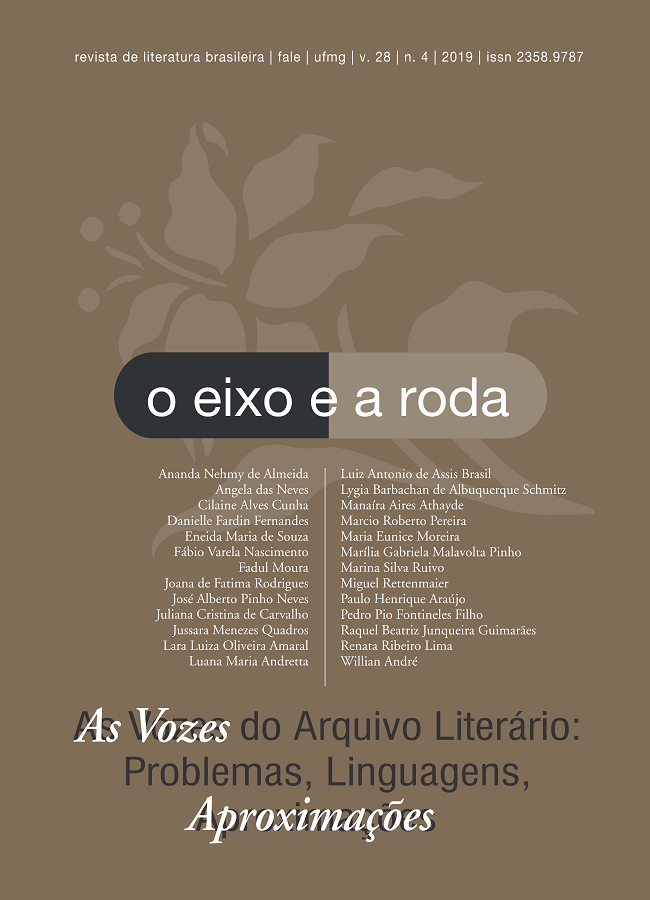As facetas do humano na percepção gonçalvina
uma análise da correspondência e do diário de viagem à Amazônia
DOI:
https://doi.org/10.17851/2358-9787.28.4.139-166Palavras-chave:
Gonçalves Dias, correspondência, diário, humano, representação, indígenaResumo
Resumo: Este artigo busca explorar a complexidade dos modos de representação do indígena em Gonçalves Dias para além da sua obra poética, a partir de textos híbridos que a complementam: seus escritos pessoais. Selecionamos, para este fim, registros de um momento crucial da trajetória do autor: o ano de 1861, em que viajou para a Amazônia e teve, assim, ocasião de confrontar o imaginário criado em torno da figura do indígena e a experiência empírica. Tendo já toda a obra indianista publicada, mas sempre com projetos de escrever mais (Os Timbiras permanecia incompleta), o poeta mestiço vive nessa viagem uma situação ímpar de reflexão, que desenvolve através da correspondência e do diário de viagem. À luz de teóricos da decolonialidade, procuramos compreender as origens do ideário que influenciou a percepção gonçalvina e situar a categoria “humano” nas suas diversas facetas, valorações e gradações. A leitura desse material sugere uma tensão racial intensa, na qual se empregam designações diversas com base na cor da pele e na miscigenação. Observamos a ambivalência presente no jogo entre convenção poética e o registro descritivo das observações pessoais, isto é, na dificuldade de definir objetivamente quem seria o índio, quem representaria a “nossa gente”.
Palavras-chave: Gonçalves Dias; correspondência; diário; humano; representação; indígena.
Referências
ANAIS da Biblioteca Nacional. Rio de Janeiro: Divisão de Publicações e Divulgação, 1971. v. 84 (1964). Disponível em: http://objdigital.bn.br/acervo_digital/anais/anais_084_1964.pdf. Acesso em: fev.2019.
BENJAMIN, W. Sobre o conceito de História. In: ______. Obras Escolhidas. Magia e Técnica, Arte e Política: ensaios sobre literatura e
história da cultura. São Paulo: Brasiliense, 1994.
CABOCLO. In: MICHAELIS Dicionário Brasileiro da Língua Portuguesa. São Paulo: Melhoramentos, 2019. Disponível em: https://
michaelis.uol.com.br/moderno-portugues/busca/portugues-brasileiro/caboclo/. Acesso em: 29 jan. 2019.
CRANIOLOGIA. In: MICHAELIS Dicionário Brasileiro da Língua Portuguesa. São Paulo: Melhoramentos, 2019. Disponível em: https://michaelis.uol.com.br/moderno-portugues/busca/portugues-brasileiro/craniologia/. Acesso em: 29 jan. 2019.
DIAS, A. G. Brasil e Oceania. Organização de Raymundo Netto; apresentação de Ana Miranda. Fortaleza: Armazém da Cultura, 2013.
DIAS, A. G. Gonçalves Dias na Amazônia: relatórios e diário da viagem ao rio Negro. Rio de Janeiro: Academia Brasileira de Letras, 2002.
DIAS, A. G.; LEAL, A. H. (org.). Obras Póstumas. São Luís: Bellarmino de Matos, 1868.
DIAS; A. G; BUENO, Alexei (org.). Poesia e prosa completas. Rio de Janeiro: Nova Aguilar, 1998.
LIMA, R. R. Dialéticas de exílio e nacionalismo em Gonçalves Dias. 91 f. 2015. Dissertação (Mestrado em Estudos Literários, Culturais e Interartes) – Faculdade de Letras, Universidade do Porto, Porto, 2015. Disponível em: http://hdl.handle.net/10216/79482. Acesso em: 9 set. 2019.
MARQUES, W. J. Gonçalves Dias: o poeta na contramão. São Paulo: EdUFSCar, 2010.
MIGNOLO, W. D. Desobediência epistêmica: a opção descolonial e o significado de identidade em política. Tradução de Ângela Lopes Norte. Caderno de Letras da UFF, Niterói, n. 34, p. 287-324, 2008.
MIGNOLO, W. D.; WALSH, C. E. On decoloniality: concepts, analytics, praxis. London: Duke University Press, 2018. DOI: https://
doi.org/10.1215/9780822371779.
MOTA, L. T. A Revista do Instituto Histórico Geográfico Brasileiro (IHGB) e as populações indígenas no Brasil do II Reinado (1839-1889). Diálogos, Maringá, v. 10, n. 1, p. 117-142, 2006.
PEREIRA, L. M. A vida de Gonçalves Dias. Brasília: Senado Federal, 2016.
QUIJANO, A. Colonialidade do poder, eurocentrismo e América Latina. In: LANDER, E. (org.). A colonialidade do saber: eurocentrismo e ciências sociais. Perspectivas Latino-americanas. Buenos Aires: CLACSO, 2005.
SCHWARCZ, L. Gilberto Freyre: adaptação, mestiçagem, trópicos e privacidade em Novo Mundo nos trópicos. Porto Alegre: IFCH - UFRGS, 2010. Disponível em: https://docgo.net/schwarcz-adaptacao-mesticagemtropicos-pdf. Acesso em: 04 fev. 2019.
VELOSO JÚNIOR, C. R. Os “curiosos da natureza”: Freire-Allemão e as práticas etnográficas no Brasil do século XIX. 2013. Dissertação (Mestrado em História Social) – Instituto de Ciências Humanas e Filosofia, Universidade Federal Fluminense, Niterói, 2013. Disponível em: www.historia.uff.br/stricto/td/1697.pdf. Acesso em: 04 fev. 2019.










